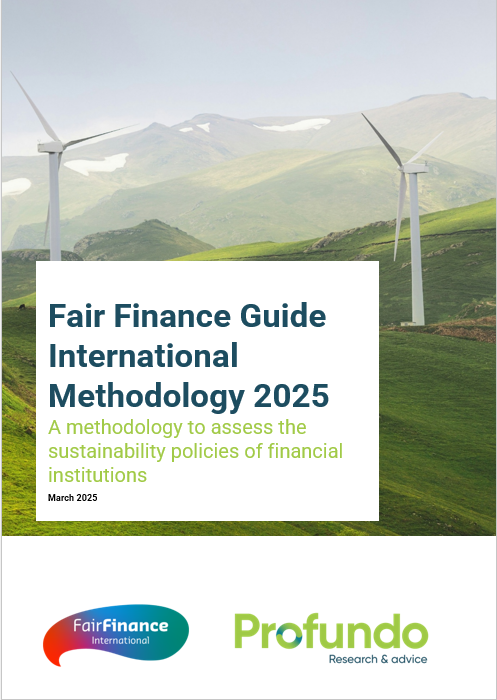Fair Finance International Releases Methodology Update 2025
Fair Finance International (FFI) is proud to announce the release of the Fair Finance Guide International (FFGI) Methodology Update 2025, developed in close cooperation with Profundo.
This latest update strengthens the framework used to assess financial institutions' policies, ensuring they align with global standards on Environmental, Social and Governance topics. The 2025 methodology introduces significant refinements across multiple themes, reinforcing FFIs’ commitment to fostering transparency and accountability in the financial sector.
The update was based on feedback from Fair Finance coalitions in 13 countries in 4 continents and also on input collected from banks and experts. In total 267 proposals for change were discussed, of which 152 were adopted by the Fair Finance coalitions.
This is the 8th update, since the Methodology was first developed in 2014. Since then, a total of 157 banks and investors in 16 countries in 4 continents have been assessed using the Fair Finance Methodology: 129 banks, 20 insurance companies and 8 pension funds. Please find the assessments here.
Key Enhancements in the 2025 Methodology
The FFGI Methodology 2025 reflects the latest international sustainability frameworks. The key improvements include:
1. Alignment with New Global Standards
The methodology now incorporates updates from the 2023 OECD Guidelines for Multinational Enterprises on Responsible Business Conduct, as well as IFRS S1 and IFRS S2 Sustainability Disclosures. These changes enhance the evaluation criteria for financial institutions that commit to these frameworks.
2. Strengthened Climate Commitments
With increasing urgency to combat climate change, the 2025 Methodology introduces new elements requiring financial institutions to set sector-specific emissions reduction targets aligned with the 1.5°C global temperature goal. Additionally, companies involved in metallurgical coal mining and biofuels derived from food or feed crops should not be financed by financial institutions. Banks and investors should, furthermore, require strict monitoring and reduction plans with regards to the main air pollutants from companies they finance. Companies are, moreover, required to disclose ISDS (Investor State Dispute Settlement) claims and to explain how they relate to their climate policies.
3. Expanded Scope on Biodiversity and Plastic Reduction
The former “Nature” theme has been rebranded as “Biodiversity”, with stronger criteria addressing corporate responsibility for reducing plastic waste. Companies in relevant industries, including oil and gas, chemicals, and fast-moving consumer goods (FMCG), must now demonstrate transparency regarding their plastic footprint and take action to minimize plastic production and use.

4. New Criteria for Gender Equality and Human Rights
The updated methodology places a stronger emphasis on gender equality, requiring financial institutions to ensure 40-60% representation of women in leadership positions and to require this from the companies they finance. Additionally, companies are now required to publicly commit to gender equality strategies and provide family-and care friendly work policies. Human rights criteria have also been expanded to include heightened due diligence in conflict-affected areas and explicit protections for human rights defenders.
5. Enhanced Consumer Protection and Cybersecurity Measures
In response to growing concerns about data security, the 2025 Methodology introduces new standards for financial institutions to provide cybersecurity training, fraud risk management, and compensation for victims of cyber fraud. These changes aim to better protect consumers in an increasingly digital financial landscape.
Why These Changes Matter
The updated methodology ensures that Fair Finance coalitions worldwide can continue to hold financial institutions accountable for their impact on people and the planet. By incorporating the latest international regulations and sustainability standards, the FFGI Methodology 2025 empowers consumers, activists, and stakeholders to drive meaningful change in the financial sector.
For more details on the FFGI Methodology Update 2025, visit Fair Finance International.
ENDS
Contact information
Bram Joanknecht | bram.joanknecht@oxfamnovib.nl
For updates on FFI follow @fairfinanceint.bsky.social You can also find us on LinkedIn.
Fair Finance International (FFI) is an international civil society network of over 150 CSO partners and allies, active in 22 countries, that seeks to strengthen the commitment of banks and other financial institutions to social, environmental and human rights standards.
As a global network we use a rigorous methodology to assess, report on, and campaign for more responsible investment policies & practices. By benchmarking the investment policies and practices of financial institutions in critical areas such as human rights and climate impact, we enable consumers and policy holders to demand more socially responsible, fair, and sustainable investments.
